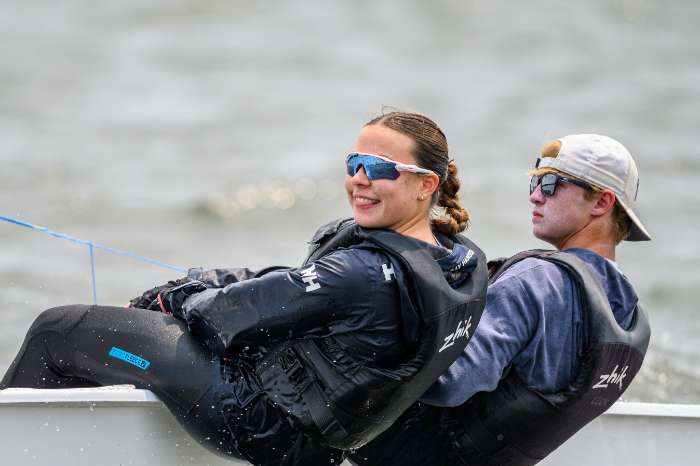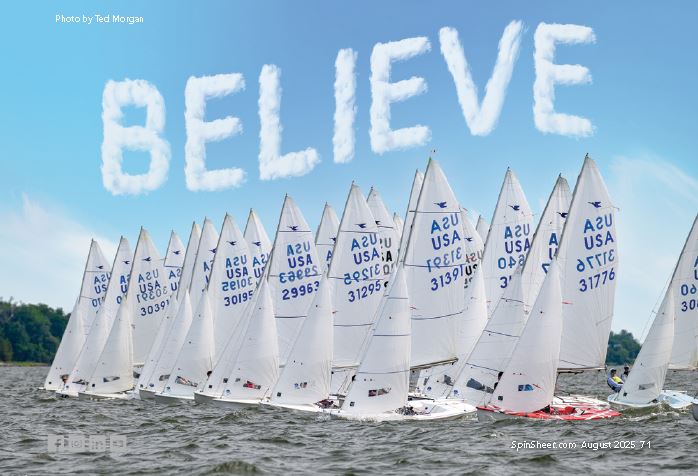Nuggets From Coach Lasso for Sailors
Some of the best news of 2025 is that Season Four of “Ted Lasso” reportedly started filming last month. Ted, Roy, Rebecca, Keeley, and the rest of the cast helped many of us weather the storm of the pandemic through examples of empathy, kindness, forgiveness, and personal growth. And of course, a lot of laughter.
While it’s about a heck of a lot more than a guy coaching a soccer team, “Ted Lasso” does provide many nuggets that can be applied to small-boat racing. Ted knows more than he (at least initially) thinks he does about coaching soccer (football!). Turns out, many of his lessons, thoughts, and folksy sayings apply to dinghy racing, too.
Hard work pays dividends
Ted dives into a challenge: To coach a struggling team in a sport he doesn’t know. From the get-go, he’s willing to endure some pain in order to grow and learn. As Ted and Coach Beard chat while onboard their flight to London in the very first episode of the series, Ted says, “Taking on a challenge is a lot like riding a horse, isn’t it? If you’re comfortable while you’re doing it, you’re probably doing it wrong.” Success in sailboat racing doesn’t happen overnight. It takes time to learn the rules, tactics, boathandling, routines, etc. (Some will say that this quote can also be applied to hiking on a dinghy—if it’s comfortable, you’re not hiking hard enough!)
Coach Lasso also realizes that to get better, you’ve got to put in the time. Ted’s first day at his new “office” is a long one, and at the end of his first day on the job, his new boss Rebecca notes he’s working late. Ted has good reason, as he wants to succeed. He responds, “As the man once said, ‘The harder you work, the luckier you get.’” Regattas are fun, but it’s practice that truly builds improvement. Time in the gym and focusing on fitness is hard work, but clearly being fitter makes you faster.
Positive attitudes fuel accomplishments
“Ted Lasso” is flush with positive attitudes—and the results thereof—both on and off the football pitch. Later in Season One, after veteran player Roy Kent had a bad game and is more than a bit down on himself, Ted says, “You beating yourself up is like Woody Allen playing the clarinet. I don’t wanna hear it.” Having a positive, can-do mindset is key to success on the racecourse for sure. Repeating negative thoughts, internally and/or externally, doesn’t foster good performance.
Moving on from suboptimal performances and experiences inspired one of the most repeated quotes from the entire series. In Season One, episode 10, after Richmond loses a critical game and gets relegated, Ted advises: “You know what the happiest animal in the world is? It’s a goldfish. You know why? Got a 10-second memory. Be a goldfish, Sam.” Have a race that doesn’t go well? Sit with it for just a moment—and move on before you start the next race. Pick the wrong side of the first beat? You can’t undo that, so accept it and move on.
Ted also emphasizes maintaining an even emotional keel. As we enter Season Two, his Richmond team has started the season with a perplexing seven straight tie games. Asked how he’s reacting to the situation in a press conference, Ted notes “There’s two buttons I never like to hit, all right, and that’s panic and snooze.” To continue making progress, whether in developing your sailing and racing skills overall or focusing on your success in an individual regatta, there’s no need to create drama, but you’ve got to stay involved and invested.

Photo by Ted Morgan
Sportsmanship is the ultimate success
From the get-go, Ted emphasizes the importance of the journey rather than the end results. Midway through Season One, reporter Trent Crimm (of The Independent) spends a day shadowing Ted on the job. After the workday wraps up, Trent joins Ted for dinner and more conversation to fuel his article. Rather shockingly for a professional coach, Ted says he doesn’t really care about his team’s record. “For me, success is not about the wins and losses. It’s about helping these young fellas be the best versions of themselves, on and off the field.”
That’s true on and off the water, too. As seasons go by, your competitors (and probably even you) will forget how you finished in any given regatta. But they won’t forget how it felt to compete against you. You want them to remember your best version.
Truly, as Ted tells Sam after Sam made a difficult decision in Season Two, “Doing the right thing is never the wrong thing.”
We’ll have to wait until late 2025 or early 2026 to enjoy and learn from more Lasso lessons in Season Four. Until then, be sure to “Believe!”
About the Author: Kim Couranz has earned several national and world titles in Laser Radials (ILCA 6), Snipes, and Lightnings. She has also raced J/22s, J/24s, and Ynglings on an international level.
**********Find more sailboat racing tips.





